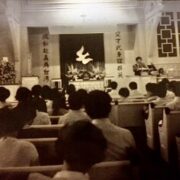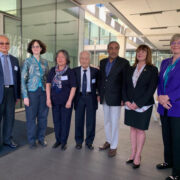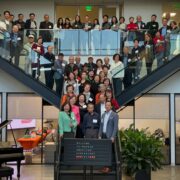The Establishment of the Chen Wen-Chen Memorial Foundation
Author: Yung Hwa Hsu
Origin
When the Taiwan Monitor, a joint publication of the University of Michigan Taiwanese Students’ Association and the Taiwanese Association of Ann Arbor, began planning to print a special commemorative issue on the twentieth anniversary of Chen Wen-Chen’s death, they asked me to recount the events of that year, so that later generations could understand what the situation was like back then. I felt that this was the best opportunity to publicize the names of Chen Wen-Chen’s friends, who couldn’t reveal themselves at the time because they were in the middle of battling a storm and doing very risky work.
The Establishment of the Chen Wen-Chen Foundation
Professor Chen Wen-Chen’s memorial service was held by the Midwest Taiwanese Association of America in Ann Arbor, the city where the University of Michigan is located, on the afternoon of July 18th, 1981. After the service ended, a few people stayed behind to rest in the basement of the church. It was apparent that everyone was in a very solemn mood, unsettled by the fact that though it was obvious that Kuomintang agents had murdered Chen Wen-Chen, there was no way to avenge his death. There was one person who wanted to settle accounts with Kuomintang student spies. Another asked whether they could donate money to Chen Wen-Chen’s family? In this way, the Chen Wen-Chen Memorial Foundation was created on the spot and began accepting donations.
On August 15th of the same year, the Midwest Taiwanese Summer Conference was hosted in Grand Rapids, Michigan. The conference also accepted donations for the Chen-Wen Chen Foundation, receiving nearly four thousand dollars in donations. The above had all been local donations. To comply with the requests of Taiwanese people from all different places who wanted to offer support and condolences to Chen Wen-Chen’s family, the Pittsburgh, Ann Arbor, Lansing, and Detroit Formosan Associations for Human Rights initiated an effort to open up fundraising to the general public. The fundraising article was published in the Taiwan Bulletin, and was reprinted in Formosa Weekly and the Taiwan Tribune. During that time, Chen Wen-chen’s wife, Chen Su-jen, had not returned to the States yet. The article stated that the entirety of the fundraised amount would be used to provide for the living expenses and education of Chen Wen-chen’s wife and children.
If Mrs. Chen and her children couldn’t return to the States for some period, the foundation would manage the funds for the children’s future education expenses. Should Chen Wen-Chen’s family be unable to receive the funds, they would be transferred into the “Professor Chen Wen-Chen Scholarship Fund.” Prior to these events, Tung-lung Hsu, President of the Pittsburgh Formosan Association for Human Rights, had initiated a Prof. Chen Relief Fund to collect donations from the local area. Tung-Lung Hsu was one of a few community members who wasn’t afraid of revealing his identity and automatically came out to help Chen Su-jen after she returned to Pittsburgh. (The other was Chin-teh Lai.) Unfortunately, not long after Chen Wen-Chen’s murder, Tung-lung Hsu suddenly learned that he had brain cancer and passed away. Let us mourn this good and righteous man together.
On September 12, the Professor Chen Wen-Chen Memorial Foundation started its second public fundraising initiative. The announcement was published in the same three publications as before. Though I wrote and published the fundraising article, the real fundraising work was done by enthusiastic community members in Ann Arbor, Lansing, and Detroit, who informed their friends of the news and encouraged them to donate. This group included Bernie Huang, Chao-fang Chuang, I-hsiung Lin, Kuo-nan Hsu, Chin-ti Lin, Hui-hui Huang, Chang-Jang Hsieh, and others. I kept a record of each other the donations. This list of donators still exists in the Chen Wen-Chen Memorial database. The foundation worked like this, without a president, let alone a founding president. Thus, when I am given the title of “Founding President” in newspaper articles or at meetings, I feel incredibly apologetic towards this group of silent but dedicated community members. How could I dare to reap the benefits of these people’s hard work!
Around late October, I suddenly received a call from Evan Ling, who said he wanted to help expand the fundraising effort, as well as organize for Chen Su-jen to speak in a few different cities. By this time, the foundation had raised over $20,000, which in accordance with the original fundraising statement, I transferred to Chen Su-jen to let her manage herself. Evan Ling was someone who I’d heard of, but never met. Later, the two of us continued to communicate over the phone about the foundation for many more years. Of course, I welcomed his assistance and efforts to expand fundraising. Following this, Su-jen visited several different cities and fundraised quite a sum of money, most of which was directly transferred to the Formosan Association for Human Rights, who managed it for us. I continued other work, like collecting a portion of the donations, organizing the foundation’s bank accounts, planning for the establishment of the Professor Chen Wen-Chen Scholarship, and working on editing and printing the Chen Wen-Chen Commemorative Book. In March 1982, the foundation was formally registered with the State of New Jersey as a non-profit organization and applied to receive tax-exemption status from the IRS. By then, eight months has passed since the foundation’s establishment.
Editing and Printing the Professor Chen Wen-Chen Commemorative Book
During that time, Evan Ling and I agreed to publish a commemorative book for Professor Chen Wen-Chen on the anniversary of his death. I was responsible for editing, collecting materials, and inviting people to write articles, while Evan Ling and his wife took charge of printing. Though I’d agreed to the task, I didn’t start working until the beginning of March, because I didn’t want to stir up all of the emotions, which had just calmed down a little. From the beginning, I insisted that all the articles for the book had to be retyped, in order to make the final printing beautiful. Apart from the articles in the book that were printed in newspapers, magazines, and those written by people I don’t personally know, there are a number of articles whose authors, up to this date, have remained unknown to the public. Even now I feel the duty to introduce these writers. As Mr. N said in the article he wrote for the commemorative book, speaking about the circumstances back then, “when writing in memory of Chen Wen-Chen, we, his friends, do not dare to use our real names. Additionally, there are still some details we wouldn’t dare to write, and photographs that we wouldn’t dare to publish.” When speaking of Wen-Chen’s friends, these people were truly his good friends. Mr. N, the author of “Remembering My Good Friend Chen Wen-Chen,” is Professor Chieh-ching Huang, who currently teaches at Texas A&M University. He had previously been Wen-Chen’s colleague at the University of Michigan.
Chang-ching Yeh, who wrote “Remembering a Good Friend Who Died for Our Home Country,” was Yung-kai Tsao, a lawyer who currently practices in Boston. After receiving his Ph.D. in biochemistry, he worked for a few years before going to study law. He and Chen Wen-Chen had been the most active individuals at the University of Michigan. The year before Chen Wen-Chen’s murder, he and I had traveled to Pittsburgh to visit his family. Mr. Chi Pu, author of “The Best CMU President Richard Cyert Did to Uphold Justice Regarding Professor Chen Wen-Chen’s death” and Mr. Chueh Min, author of “Pittsburgh, the Center of the Storm” were both actually Lung-ho Lin, who currently teaches at the University of Akron in Ohio. Though he’d never met Chen Wen-Chen before, he kept in close contact with reporters from the Pittsburg Post-Gazette about the Chen Wen-Chen incident. Chiu Chuan, author of “Wishing He Comes Back to Life,” and Hu Yang, author of “I Mourn the Death of My Good Friend Chen Wen-Chen,” were both Yung Hwa Hsu. The articles written under the pen name Hu Yang were published in the Formosa Weekly.
Shu Ling, the author of “A Candle Turns to Ashes, Tears Still Wet,” was Su-lien Li. Chen Long Tsai, who testified in front of the U.S. Congress under his real name and face, was a truly courageous friend. The editorial board of the commemorative book each had two-character pen-names: Lin Tien was Lung-ho Lin, Kan Tzu was Elena Ling, Li Pu was Yung-kai Tsao, Shih Lin was Evan Ling, Hsu Chieh was Yung Hwa Hsu. Of course, the amount of people who were involved in this project are not limited to these people. For example, Ta-wen Chen organized a portion of the information about new articles.
Sending Money to Shih Ming-teh
After Wen Chen-Wen’s murder, the newspapers kept dramatizing the story, saying that he had sent money to Shih Ming-teh, and Shih Ming-teh also believed that he’d received money from Chen Wen-Chen. Up to this day (April 1993), newspapers are still publishing about past events, speculating about who sent money to Shih Ming-teh, and how much they sent. I have no clue how many people sent money to Shih Ming-teh, but the money raised to support Formosa Magazine wasn’t sent by Chen Wen-Chen, even though he’d previously talked with Shih Ming-teh over the phone about wanting to fundraise money to support Formosa Magazine.
The money sent in 1979 was sent by two Michigan Taiwanese, I-hsiung Lin and Bernie Huang. To the day, the receipt of the transfer is still being kept in the Chen Wen-Chen database. Before they sent the money, they called me to ask how they should do the transfer. In the end, they sent the money under the name of the Ann Arbor Taiwanese Association to First Bank in Taipei for Shih Ming-teh. After the money arrived, the Taiwan Democracy Newsletter, published by Kuo Yu-hsin in the United States, reported on this news saying that due to this sum of money, the Kuomintang had interfered quite a bit with Shih Ming-teh. Linda Arrigo, Shih’s wife, also complained, saying that the money had actually harmed Shih Ming-teh.
Organizing Chen Wen-Chen’s Memorial Service
When news of Chen Wen-Chen’s murder reached the United States, many people didn’t know who he was. Some people, especially the representatives of various organizations, first wanted to understand what his political allegiances were; they wanted to know if he was pro-unification or pro-independence, a comrade or opponent. So, they didn’t even publish a statement condemning the atrocity. Ann Arbor and Pittsburgh, the two cities with the closest relation to the victim, had even less signs of movement. Taiwanese from other places wondered if they’d been frightened into silence by the murder. As the Houston Taiwanese Association stated in its article, urging people to mobilize a demonstration, “These incidents began in Ann Arbor and Pittsburgh, so they also receive more pressure from the Kuomintang. It is possible that the Taiwanese Associations in these cities are more apprehensive about taking action.” Therefore, a demonstration was launched in Houston on July 15th. Both Ann Arbor and Pittsburg waited until Saturday, July 18th to hold memorial services. The Taiwanese Association of Ann Arbor took a very steady approach and didn’t ask any other organizations for help, so there wasn’t the same “we’ll bring the people, you bring the food” situation that occurred in Pittsburgh.
In addition to fellow Taiwanese from Detroit, Lansing, and Ann Arbor, there was also a large number of people who came from Chicago to attend the memorial held in Ann Arbor. They voluntarily offered their support, saying that they were prepared to take action if needed. Truly, all of us were ready to take action. The memorial itself need not be detailed here; instead, I’d like to briefly write about what I can remember about the great efforts of one Taiwanese community member, Bernie Huang, who contributed a lot to the preparation of the memorial service. First, he made a copy of Chen Wen-Chen’s photograph to be used across the United States. He also published the news of the memorial service in student publications at the University of Michigan, Michigan State University, and Wayne State University, and ordered ten wreaths for the service. Chao-fang Chuang composed and read out an elegy titled “All is Lost,” Pastor Ming-hsiung Wu led the service, Chin-ti Lin recalled memories of Wen-Chen’s life, and Chiau-Seng Hwang donated the funds necessary for the service. Additionally, Felix T. Hong, I-hsiung Lin, and Kuo-chu Hsu helped with other tasks like drafting articles for publicity, putting up posters for the service, purchasing wreaths, and helping with communication. Other tasks were taken care of by other members, though I’m not clear on the details of who did what. The memorial was held during a time when everyone was terrified and felt unified against a common enemy. All of the members of the Taiwanese Association who had been regularly attending events felt the need to take action, and they suppressed their sorrow to come and remember a close friend. To protect their safety, we did not encourage students to participate, but many still came of their own volition. The memorial service couldn’t relieve the bitter hate within our hearts, but there was nothing else we could do but sing our lamentations and cry in memory of our friend. The only thing to do was to secure the legacy of the life that he had sacrificed for the Taiwanese people. Through the hard work and efforts of the Taiwanese community, we have finally achieved this goal.
(May 11th, 1993 4:40 AM)
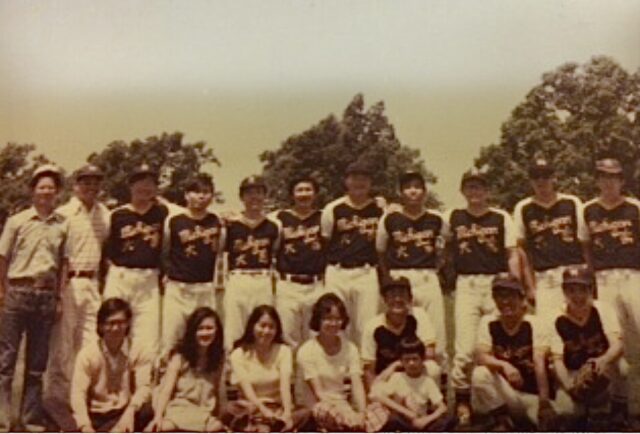
7/4/1976 Summer Conference, Ann Arbor, Michigan, Softball Tournament. Back row, first from the left: Yung Hwa Hsu. Back row, fourth from left: Chen Wen-Chen.
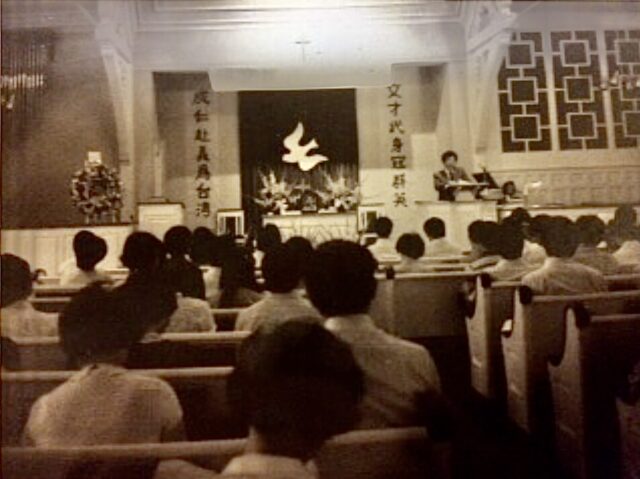
7/18/81 Ann Arbor, Michigan. Yung Hwa Hsu speaks at Chen Wen-Chen’s Memorial Service.
Sourced from Taiwan Monitor #2 – Chen Wen-Chen Memorial Issue (06/1993)
Translated from 321. 由陳文成紀念基金會的創立談起 / 許永華 /11/2017

